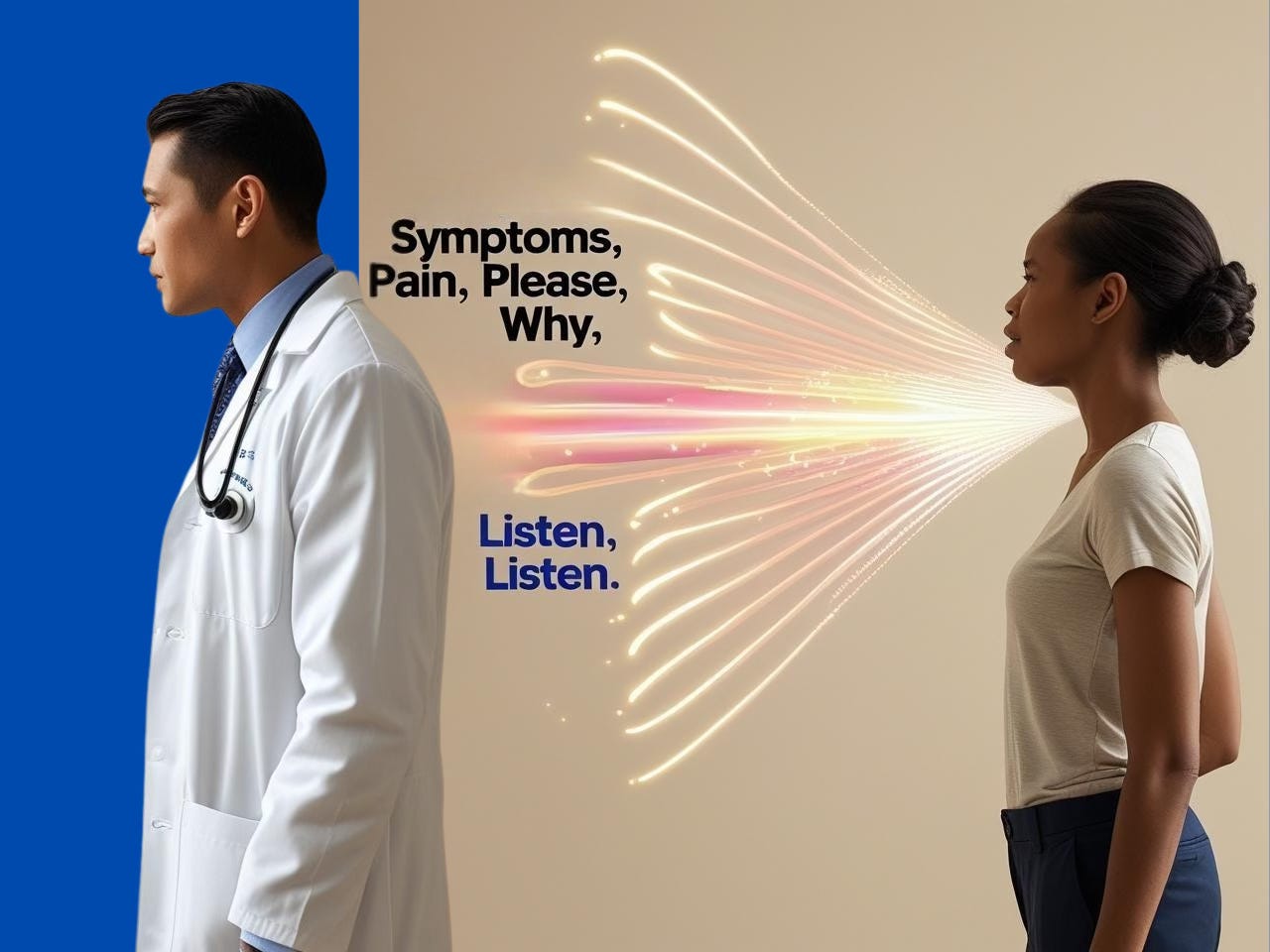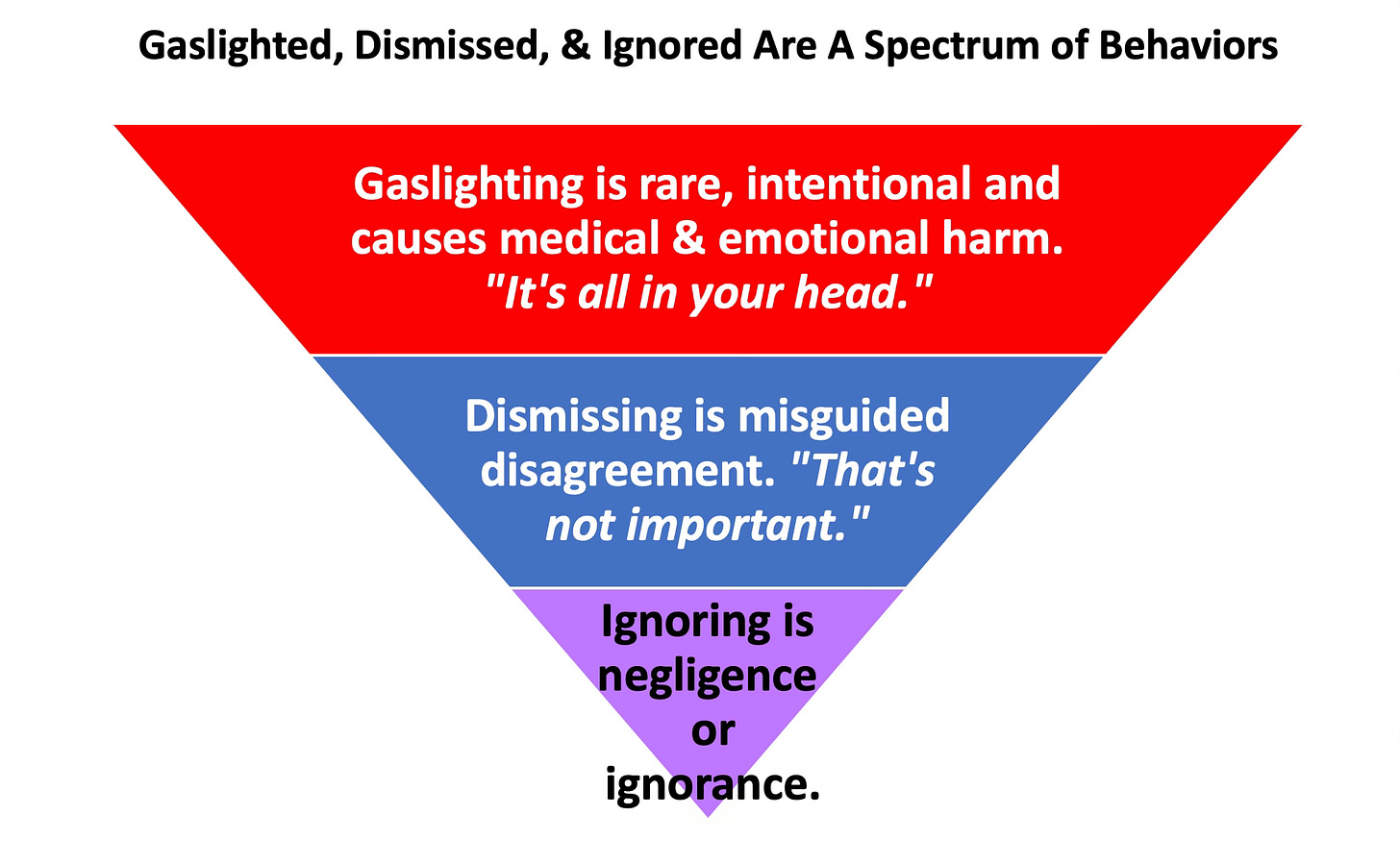I had just moved back to New York City and made an appointment with a new-to-me highly regarded primary care doctor. My annual checkup would be a few months later. Today I was there to meet her, discuss three issues and get some prescriptions renewed. It started well; we reviewed my current prescriptions and supplements, and the medical history questions on her input form.
My concerns were straightforward:
I had terrible pain in my right arm from trying to move a box I never should have lifted in a way I never should have tried. I felt and heard a ligament snap and retract. I asked for an imaging appointment or a referral to an orthopedist to confirm what had happened.
I have always had IBS. I had new and unusual digestive pain and symptoms and asked for a referral to a gastroenterologist.
I noticed that when I sat or lay down, even for a few minutes, my left thigh would go numb. Despite being numb, it was uncomfortable and the skin was tender to the touch. What could this be, I asked her. Circulatory? Orthopedic? Should I see a specialist?
I expected she would examine my arm and my leg and give me referrals to specialists she respected. She didn’t. She never left her chair except to leave the room. She never gave me the names of any specialists. Here’s what she did instead.
She insisted my arm was fine and I had just strained it. She recommended I take Aleve (a brand of NSAID) for pain at double the recommended dosage on the package and rest my arm.
She said my new digestive issues were probably due to stress from the move and the pain in my arm. She recommended I eat bland foods for a week and see how I felt. Specifically, she suggested bread and cereal with low-fat milk, poached chicken breast without sauce, healthy vegetables and fruit.
She said my leg going numb was nothing and scolded me for wearing tight leggings. “Stop wearing tight pants and your leg will be fine,” she insisted.
She was wrong on all counts and she misdiagnosed me three times in that one appointment. Look at each of her reactions and tell me: did she dismiss me, ignore me, or gaslight me? Which was which?
Definitions
Gaslighting: Summed up with the phrase, “It’s all in your head.” Medical gaslighting is when a doctor actively undermines our perception of our own symptoms or experiences. It’s rare to be truly gaslighted by a doctor. It’s a form of psychological manipulation and often extremely harmful. Gaslighting happens when the physician thinks we aren’t a reliable narrator. They may suspect we’re not educated, overreacting, or mentally ill which can lead us to doubt our own minds.
Dismissed: When our symptoms, concerns or questions are minimized or rejected outright by the doctor because they believe they’re not important or valid. It’s frequently confused with gaslighting but far more common and not intentionally meant as manipulation. Often, they don’t realize they’re being dismissive. Dismissing a woman’s or a Black patient’s pain is a common example.
Ignored: When either a medical history fact or our spoken concerns are simply overlooked or not considered by the doctor. It’s also more common than we’d like. It could happen with anything a patient says or shares. The doctor simply doesn’t add it to their thinking about a possible diagnosis or treatment plan. Being ignored often makes us feel invisible.
What My Doctor Missed
While you think about the answers, here are my final correct diagnoses:
The terrible pain in my right arm was a torn ligament. She was correct about needing to rest it but wrong to tell me it wasn’t torn and wrong to prescribe Aleve. [Read on for why.] The orthopedist I found on my own prescribed RICE therapy (Rest, Ice, Compression and Elevation), a better pain medication and physical therapy. He also told me the delay in my care meant the healing would take longer, Her misdiagnosis harmed me.
I told her I had IBS for decades. Her recommended bland diet is well known to aggravate IBS symptoms. The high dose of Aleve was even worse. Both gave me crippling daily pain in my stomach and colon. I found a great gastroenterologist who identified what was happening. My colon was overreacting to a group of foods known as FODMAPs.1 He sent me to a nutritionist to identify which ones to avoid. People with IBS also can’t use most NSAIDS. The Aleve gave me my first ulcer. The combination caused me physical, emotional and financial harm. Three endoscopies and two colonoscopies later, it’s under control.
My numb left thigh wasn’t due to tight leggings. All leggings have a percentage of stretch in the fabric so I knew it was a ridiculous statement. But my numbness and sensitivity grew. Turns out it was due to spinal inflammation like many experience in middle age. I get spinal cortisone shots every so often and they work well.
Which Ones Did My Doctor Do?
So, what did you guess? Was I gaslighted, dismissed or ignored? Tell me in the comments. Here’s my opinion:
Right Arm: She dismissed my symptoms and reported experience of a torn ligament.
Digestive Pain: She ignored my long established IBS diagnosis when she prescribed doubling Aleve for my right arm pain and dismissed my reports of new troubling digestive symptoms.
Left Thigh: She gaslighted and dismissed my reports of numbness, suggesting the outfit I wore that one day was the cause of months of symptoms.
What You Can Do If You’re Gaslighted, Dismissed Or Ignored
Here are nine suggestions:
Gaslighting:
If you believe your doctor is actively gaslighting you –– undermining your sense of confidence and mental health –– RUN. Find another practice as soon as possible.
If you live in a healthcare desert with limited choices, try another, maybe younger, doctor in the practice. Be honest and say that you had a difficult relationship with the first doctor and you want a fresh start.
In either case, please use the tools in Chapter 7 to ensure your fresh start is the beginning of a beautiful relationship based on mutual respect.
Dismissed:
If you feel your primary care doctor doesn’t take your symptoms seriously, but want to stay with your current doctor:
Ask “What else might this be?” And then ask, “What do I do if these symptoms get worse?” This may help if your doctor is experiencing cognitive bias, thinking that your age, gender, race, ethnicity, weight or anything else means that your symptoms are unlikely. My mother-in-law died at 41 from breast cancer because her symptoms were dismissed by a doctor who told her she was too young to get breast cancer.
Always bring a friend or family member with you to listen and support you. I’m sad to admit it, but bring a man as your back up, even if you’re a man. The odds of being dismissed go down with witnesses, especially male ones.
Your doctor may not be up-to-date on what is possible for a person of your age and gender. Here is a link to the types of preventative health screenings that should be routinely covered by insurance and ordered for you, today. There are three lists: one for all adults, one for women, and one for children. Print it out and bring it in. If they refuse, time to change to a medical practice that’s aware of why different genders and ages have different medical concerns. We’ll cover more about the best screenings if you’re a person of color in Chapter 19.
If your doctor is just not worth the effort or you’re uncomfortable with pushing back:
follow the steps in Chapter 5 to locate a better medical group or doctor. A fresh set of eyes is extremely helpful. Try to find a medical practice where you can feel more comfortable, one you can trust.
Ignored:
Doctors are time-pressured but that doesn’t mean they should miss important details. Communication is a two-way street. Are they not listening or are you not communicating clearly? Both may be true at the same time.
Review how to present your symptoms factually, clearly, quickly, and without unnecessary details. Sometimes symptoms are just lost in a list that’s too long or filled with irrelevant details. Most importantly, put your symptoms into context.
If you feel that your doctor or nurse-practitioner is consistently ignoring what you have to say, even if your symptoms continue to progress, find another primary care practice. Reread Chapter 5 for tips on how to do that.
Have you been gaslighted, dismissed or ignored by your doctor? What happened? How did you feel? What did you do? Please share your stories in the comments below.
Next Up: Chapter 11: Get A Second Opinion, Get A Second Opinion, Get A Second Opinion
© Helene M. Epstein, 2025
FODMAPs are group of short-chain carbohydrates (sugars) that don’t absorb properly in the gut for the 10-15% of the US population with Irritable Bowel Syndrome (IBS). They affect both the small and large intestines causing the intestinal wall to stretch and expand which is especially painful for people with IBS.







Great advice!!